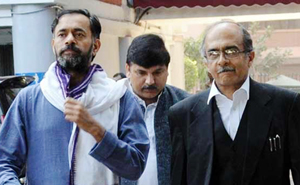New Delhi, Mar 26: Reconciliation talks between the two warring factions in AAP, appeared to have been collapsed today with chief minister Arvind Kejriwal insisting on Yogendra Yadav and Prashant Bhushan quitting the National Executive, ahead of the crucial National Council meeting on March 28.
Sources said Yadav and Bhushan made it clear that there was no valid ground for them to step down from the 21 member National Executive and the rival camp should instead address the issues raised by them.
Kejriwal, a key aide of his said, remained firm that the two should quit the National Executive before the National Council meeting on Saturday.
Last ditch efforts by party Lokpal Admiral Ramdas to push for reconciliation failed to make any headway with both camps sticking to their stands.
However, Ilyas Azmi, member of the Political Affairs Committee (PAC) said patch up efforts were still underway. "We will keep trying till the last minute," he said after the PAC meeting here.
Ahead of the meeting, Ramdas, a former Navy chief, held deliberations with Kejriwal for more than an hour, during which he is understood to have conveyed to the party leader to take steps to restore unity and peace in the party.
"He (Kejriwal) is not willing to concede and has been demanding resignation of Bhushan and Yadav. Even Ramdas tried to intervene, but it is heading nowhere," said a leader close to Yadav.
Those backing Bhushan and Yadav said that the two leaders will not concede to the demands of Kejriwal.
The internal rift figured in the PAC, the highest decision making body, where majority of the members reasserted their strong support to Kejriwal.
The party's NC is expected to deliberate on the issues in the party. Both Kejriwal and Yadav are trying to consolidate volunteers support ahead of the meeting.
The talks that began last week with the aim of bridging the trust deficit between the two groups after Yadav and Bhushan were ousted from the PAC showed no signs of rapprochement.
Yadav and Bhushan have been pressing for resolution of key issues like implementation of critical matters such as volunteer participation in AAP's decision making, autonomy to its state units, bringing the party under the ambit of RTI and appointment of Lokayukta at the state level.
Late in the night, Yogendra Yadav said, "A fake campaign is being run in my name. Callers with false identities proposing me as national convenor. Ridiculous. Outrageous. BEWARE!(sic)."
"More info about fake campaign coming in. If anyone calls you on my behalf and solicits support for me against AK (Arvind Kejriwal), please note the no and report," Yadav tweeted.
The tweets came in the backdrop of reports that calls are being made and messages sent to AAP volunteers and National Council members purportedly on behalf of Yadav, projecting him as the National Convenor replacing Kejriwal.
Earlier, reports surfaced that AAP leader Shanti Bhushan was going to hold a meeting with the dissidents, a day before the party's National Council meet on March 28, to discuss the issues of 'swaraj' and 'internal democracy'.
Shanti Bhushan has, however, denied the reports.





Comments
Add new comment